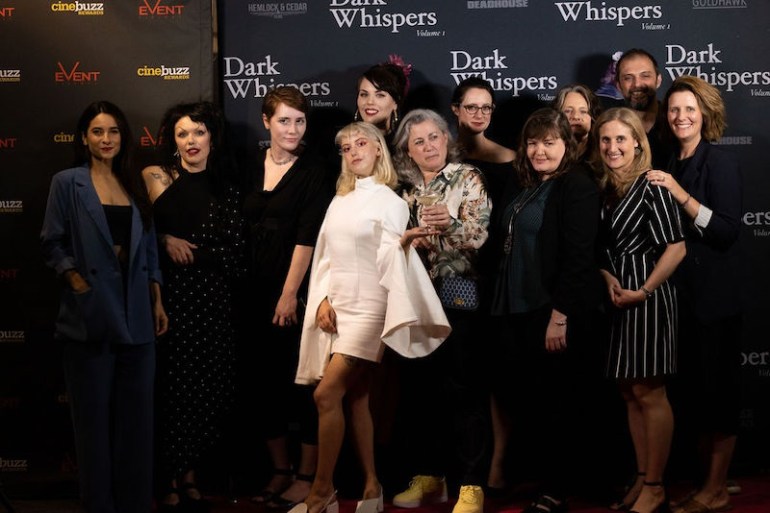The ‘Dark Whispers’ creative team. (Photo: Lauren Orrell)
The impact of COVID-19 is having far reaching effects on the entire world and no one industry is immune to the fallout, however freelancers and casual workers (including independent filmmakers) are the canaries in the coal mine.

I was in the United States at Cinequest Film & Creativity Festival with our feature Dark Whispers – Volume 1 (produced by myself and Leonie Marsh) when the COVID shutdowns escalated. The festival was abandoned midway in after the mayor shut down the city’s large events, leaving festival staff, audiences and of course the filmmakers from around the world shell shocked and stranded in San Jose. We were lucky and got to screen some of our sessions but others now have films without an official premiere and at a loss of what to do about their release strategy. As filmmakers do, we congregated at the filmmakers lounge (at a safe social distance!) and drank shots to ward off germs and commiserated. From there I was already planning to head to LA where I was to take up a residency at Charlie’s at Australians in Film via Screen NSW and to attend industry meetings and events before heading to Virginia for another festival. All seemed safe to proceed, but after two days in LA, the entire industry and city started shutting down around me. In a matter of three days it went from business as usual to a shuttered shop. All the meetings I had arranged were cancelled or moved to phone calls, events I planned to attend halted, schools were closing down, supermarkets were a battlefield and all of a sudden I was in LA with a real prospect of being stuck. I made the call to get the hell out of Dodge and booked a flight home leaving on the fourth day to arrive back in Australia hours before the mandatory lock down for all overseas travellers. So in a matter of days, at least four festivals have been cancelled plus a number of planned event screenings in Australia have been thrown into disarray with all income from these now lost. Alongside the Dark Whispers casualties, another project I wrote and directed an episode on – Deadhouse Dark Produced by Enzo Tedeschi and Rachele Wiggins, was due to world premiere at Canneseries at the end of March alongside MIPTV which has now been postponed to October.
It is incredibly hard to quantify the financial impacts of this crisis, but even harder to understand the lost opportunity to careers and projects that cancelled premieres and the momentum these things normally bring. As independent filmmakers we sit in such a precarious position, we go into debt, spend an extraordinary number of hours on our projects for little or no pay and take on a whole lot of personal risk in the hope that we can create something meaningful, that we can reach audiences, progress our careers and to recoup our investment. I am lucky, I have a casual non-film job that I can fall back on to at least pay my rent, but so many other filmmakers have lost revenue and upcoming jobs within the industry, while their fall back jobs in retail, hospitality, casual teaching, speaking engagements etc are also being lost in these unprecedented times. Being a freelancer in the creative industry always requires a precarious juggling of several jobs to stay afloat, but you don’t ever think that all the balls will fall at once. And that’s not to mention the additional stressors for those with compromised immune systems and health issues or family members at high risk that have even more to worry about.
Despite this terrible time, I do think there are some good things that can come out of all this – I am already rescheduling video meetings with the LA companies I intended to meet with, something that would’ve been very unlikely before the shutdown and hopefully this means that business around the world will open up more for us down under. Later in the year once we can move freely again, I can build on these online relationships when I return to LA to complete my Charlie’s residency.
It is also making our industry more accessible – through my work as co-founder and board member at WIFT Australia we intend to use this opportunity to become much more inclusive by releasing a series of webinars and online networking that will continue to foster our community while enabling participation from those not normally able to attend – regional members, those with caring responsibilities/work commitments or with a disability (stay tuned!).
For the next few months, we need to band together as an industry, support artists in whatever way we can, be that viewing their work online so they get residuals, buying a voucher to a cinema or theatre company, purchasing a painting or book online or just being there to listen and support the community. We can use this time to reflect and create, so when the storms subside we are ready and raring to go.


